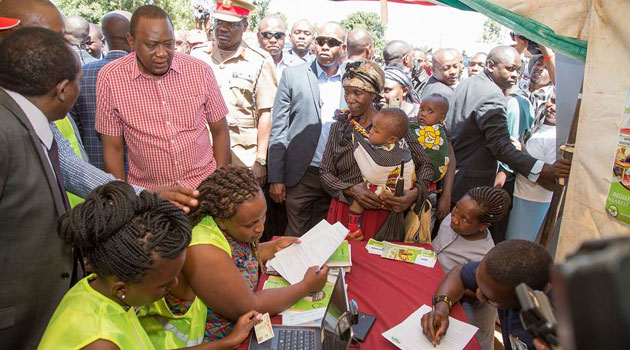
The heightened campaigns and extreme measures employed to compel Kenyans to register as voters seem not to have given people convincing reasons as to why they need to register as voters/FILE
NAIROBI, Kenya, Feb 1 – What is the big deal if only few Kenyans voluntarily register as voters and only a handful of them vote at their own will?
It is a question that encapsulates so many other factors that can be considered as the country ponders why there is widespread voter apathy in the ongoing Mass Voter Registration (MVR) exercise.
The heightened campaigns and extreme measures employed to compel Kenyans to register as voters seem not to have given people convincing reasons as to why they need to register as voters.
At the onset, voter registration is a continuous exercise, the same way as issuance of Identity Cards.
But one wonders why the two exercises look like one-time events.
Reducing continuous processes to events makes them more expensive and consume more time.
In fact, they are also not assurances that the people targeted to register as voters will make use of them in consideration that the Independent Electoral and Boundaries Commission (IEBC) target was short by over one million voters two weeks into the month-long registration exercise.
In Germany and several other countries for example, the cost of a voters’ card is in fact eliminated because one becomes a voter the moment they acquire a national Identity Card and have attained the age of 18.
“In Germany we don’t have any mass voter registration. We have our normal register of residence when you are born you are already registered as a citizen at your municipality and when you move you are required to register at your new town and so the state has all that data already and it uses this to form the voters’ register,” says Dr Alexander Puk, First Secretary for Political Affairs, at the German Embassy.
But for such a system to work, registration of people is mandatory and continuous from the moment a new birth is listed.
The system is so accurate that by the time one is turning eighteen – which is a requirement for a voter – the state already has the information keyed into the voters’ register.
When people move from one municipality to another, they are required to inform the new municipality that their residence has changed to ensure their records are captured.
“Since you have the register of residence, it automatically puts the names of those people turning 18 into the voters’ register,” he explained.
On the voting day, German citizens who have attained the age of 18 voluntarily show up at polling centres only with their national Identity Cards and the moment they present them, they are allowed to vote since they are listed in the voters’ register already.
“Once you have a good and solid registry of residence you might not need an additional voters’ register and you might not need to collect all this data again,” he explained.
In Kenya on the other hand, it is mostly during election seasons that people show up in big numbers looking for replacement of lost Identity Cards while others who attained the age of 18 some years back wait until they hear there is an election coming up for them to flock to registration bureaus.
Though the German example sounds far-fetched looking at the Kenyan social set-up and the challenges faced even in registration of births and deaths, could it be something that can be considered to cut down on expenses and make the processes easier and reduce the baggage of holding an Identity Card and a separate voters’ card?
Independent Electoral and Boundaries Commission Chief Executive Officer Ezra Chiloba believes that with technological advancements, it is an important consideration to merge identification documents.
“Countries are at different stages of development. In Kenya the voters’ card is always separate from the civil registry. But if you look at how technology has evolved, I think in future we are going to see these two identification documents are merged so that they have a multi-purpose,” he explained.
Ghana has already embraced the technology despite initial challenges of having unreliable register of persons.
“They did not have a register of persons database. But when they started doing registration of voters using biometrics, then the voters were issued with cards it started graduating to be like the form of identification for any other business other than voting,” Chiloba explained.
However, merging the two documents, he explained depended on the electoral system because in the Kenyan setup, a voter indicates where they would like to cast their vote and not necessarily based on their residence.
But should the system be employed in future, Kenya will not spend money and time on the nine million Kenyans with Identity Cards who are not listed as voters since the system will automatically mark them as voters when they show up to cast their votes.








































